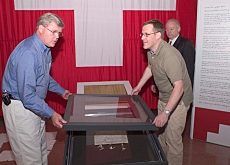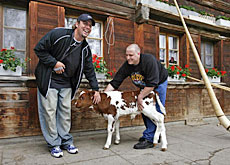Federal charter returns to sender

A 17-line parchment document that made Switzerland the world's first republic, is returning home after being on display in the United States.
The 715-year-old federal charter went abroad for the first time on June 8 to go on show at the National Constitution Center in Philadelphia.
The charter, which had been insured for SFr1 million ($815,000), was to travel back in a special suitcase handcuffed to Kaspar Michel, the archivist of canton Schwyz who is responsible for the document. It was then to be given a police escort back to the federal charter museum in canton Schwyz.
The historic document went on display on June 10 as part of a three-week exhibit called “Sister Republics”, which highlighted the historic connection between both nations’ democracies.
“We feel very honoured to have been able to show the charter,” said Steve Frank, the Constitution Center’s vice-president of education and exhibits.
“Here it was in the right place – just a few metres from Independence Hall, where the US Declaration of Independence was adopted and the Constitution was drafted and signed.”
Frank said the exhibition, which ended on Friday, had been “spectacular” and that feedback had been “very positive”.
Some 4,000-5,000 people visited a day, whereas a total of 10,000 people a year go to see it its museum in Schwyz.
Inspiration
Karl Niederer, responsible on the US side for Sister Republics, also said the three-week exhibition had been a success. “It was interesting for the visitors and good advertising for Switzerland,” he said.
Niederer, who himself has Swiss roots, added that it was a shame that the Bundesbrief had to leave Philadelphia – “but when you think of its significance, it is obvious that we can’t keep it any longer”.
Along with the Magna Carta, which was issued in 1215, scholars say the charter helped inspire the Declaration of Independence, which was drafted five centuries later.
Americans are very familiar with Switzerland’s watches, cheese and bank accounts, but few have heard of the federal charter.
Even Frank admitted: “I learned about it when it was brought to us.”
Cornerstone
The exhibition was one of the main events of Swiss Roots, a wide-ranging campaign to bring the US and Switzerland closer together.
Swiss Roots aims to invite the estimated one million US citizens with Swiss origins to discover what Switzerland is all about.
The charter – “a cornerstone of Swiss civilisation” according to some rightwing politicians in Switzerland who did not want it to be taken out of the country – was under tight security for its journey to Philadelphia and was only viewable under a bulletproof glass case.
Michel said the Sister Republics exhibition had given a promotional boost to both the charter and the museum in Schwyz.
“Over these past four or five months, the media haven’t stopped talking about the Federal Charter. What [other] museum can benefit from that kind of publicity?”
He added that attendance at the Schwyz museum had since shown increasing numbers.
swissinfo with agencies
There are about one million Americans of Swiss descent.
More than 5,000 US towns and cities have Swiss names.
Most Americans with Swiss roots live in California, New York State, Ohio, Pennsylvania and Wisconsin.
The first Swiss Federal Charter, also known as Letter of Alliance, was written in 1291.
It documents the union of three cantons of what is now central Switzerland. The alliance was set up for defence purposes.
The letter is on permanent display in a museum in the central town of Schwyz near the mythical birthplace of Switzerland. The authenticity of the charter is disputed.
Other federal charters were written in the subsequent years from 1291 to 1513.

In compliance with the JTI standards
More: SWI swissinfo.ch certified by the Journalism Trust Initiative










You can find an overview of ongoing debates with our journalists here . Please join us!
If you want to start a conversation about a topic raised in this article or want to report factual errors, email us at english@swissinfo.ch.